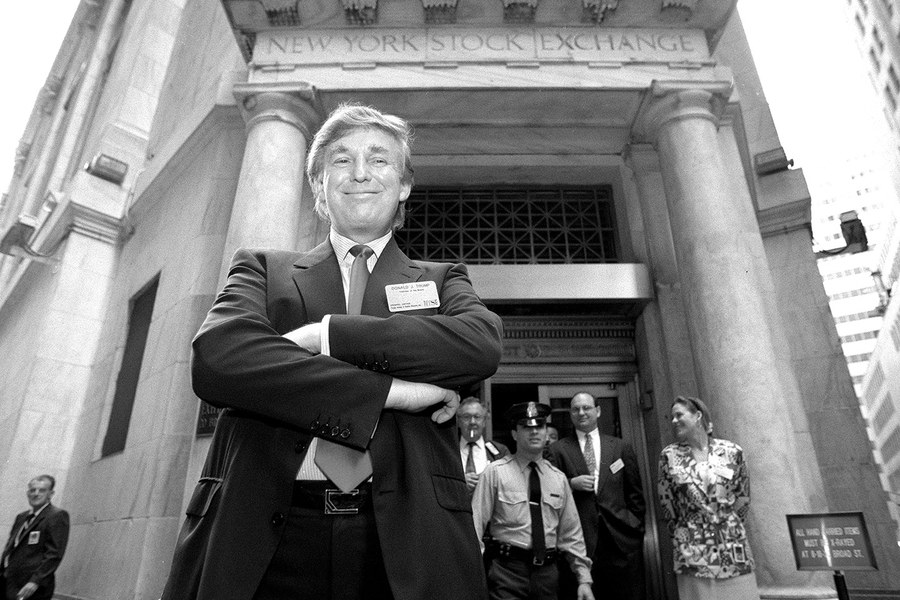During a recent luncheon at the glitzy Hunt & Fish Club on West 44th Street, in Manhattan, Frank Luntz, the renowned political consultant and pollster, offered a group of influential Wall Street bankers—a deep-pocketed array of politically connected hedge-fund managers, finance vice-chairmen, and private-equity mini-moguls—a shocking dose of reality about the 2016 presidential election. While playing a video that documented some of Donald Trump’s greatest hits—his dismissal of Marco Rubio as “Little Marco,” for instance, and the suggestion that neurosurgeon Ben Carson had “a pathological temperament”—Luntz stopped the tape.
Luntz has continuously noted that he has no preference in this election, but he pointedly explained that he had never before seen a politician like Trump. He then walked through the litany of the Trump horribilis: how he had made fun of the physical disability of a New York Times reporter; how he called Mexicans rapists and said that John McCain wasn’t a war hero; and how he suggested that Carson had the same traits as a child molester.
And yet Trump was moving ever closer to becoming the presidential nominee of the Republican Party.It was one thing for the American people and the media to misjudge Trump. But how could Wall Street, which often accurately foresees everything from the price of a barrel of oil to the price of a share of Google, have missed this phenomenon?
Indeed, the travails of Anthony Scaramucci, a hedge-fund manager at SkyBridge Capital, are a useful Baedeker to Wall Street’s collective journey through the minefield of the 2016 election. Scaramucci, an avowed but moderate Republican, was an early and enthusiastic supporter of Scott Walker, the controversial Republican governor of Wisconsin. When Walker quit the presidential race last September, Scaramucci switched his support—and his ability to corral significant political donations—to Jeb Bush. Then Bush dropped out of the race, in February.
Now, the Mooch, as he is affectionately known on the Street, is left scratching his head, having underestimated Trump from the start. He shared his frustration with the lunch crowd at the Hunt & Fish Club, of which he is a part owner. “I’m going to say one last thing to the Democrats here, because I really don’t want Trump to be president, so I want you to listen very carefully, O.K.?” he said. “He was underestimated by Walker and his team. He was mis-underestimated—which is a George W. Bush word and which doesn’t exist—he was mis-underestimated by the Jeb Bush team. Now he’s been completely mis-underestimated by the entire Republican Party. And when she”—referring to Hillary Clinton—“talks about him, she sounds and smells like she’s already underestimating him. So I’m just giving you guys a heads up. Do not underestimate the guy.”
The Mooch, who also hosts the revival of the Wall Street Week television show on the Fox Business Network, said he now believes that Trump could indeed be president. “I didn’t believe that three months ago,” he continued. “Listen, I ran out of holidays. I said on TV he was going to be out on Labor Day. I said he was going to be out on Thanksgiving. I said he was going to be out on Christmas. I ran out of goddamned holidays!”
For his part, Luntz said that Wall Streeters could be forgiven for mis-underestimating Trump. After all, they have had little interaction with the people who now support him. His supporters don’t wear nice suits with expensive ties. They may eat at hunting and fishing clubs, but not ones that serve a Kosher rib eye for $61.
Yet it remains a baffling aspect of Trump’s political appeal that so many working-class people have put their faith in a multi-billionaire who does exhibit such familiarity with those sensual and aesthetic pleasures. During an August Twitter spar with Trump, Luntz proffered an explanation to Politico. Trump, he said, is “delivering a big ‘fuck you’ to the elites in America. And that resonates on both sides. But ‘fuck you’ doesn’t solve anything. ‘Fuck you’ doesn’t make life any better. ‘Fuck you’ makes you feel good, but it doesn’t get you where you need to go. ‘Fuck you’ doesn’t make America strong. ‘Fuck you’ doesn’t solve anything.” (Luntz told Vanity Fair that he regrets his use of language, but stands by his analysis.)

In this election cycle, Wall Street finds itself with a paucity of options. As much as the industry seems to abhor Trump, it dislikes Ted Cruz and his brand of holier-than-thou zealotry even more. As for John Kasich, who worked at Lehman Brothers for seven years until it filed for bankruptcy, in September 2008, the calculus is simpler: he’s just a bad bet. Nor do many on Wall Street have much fealty to Hillary Clinton. Despite accepting $675,000 from Goldman Sachs in exchange for answering some questions in 2013, candidate Clinton has responded to the surge of populism in her party by lambasting Wall Street at every turn.
Luntz showed a video of phrases that Hillary uses in her speeches superimposed upon phrases that Bill Clinton used in his speeches back in the day. Shockingly, they were nearly identical. This perceived lack of authenticity is part of her problem. Clinton’s challenge “is not because of Benghazi,” he told the lunch crowd. “It’s not because of Bill. It’s because of a lack of authenticity. . . . Her biggest enemy isn’t the Republicans. Her biggest enemy is her.”
Wall Street can vacillate between supporting Democrats and Republicans, but in the end it always likes to back a winner. And given the impending reality of its current political Sophie’s choice, it is now throwing its considerable support behind Clinton. Perhaps surprisingly, that makes a lot of sense. Not only is the alternative so heinous, but in my experience, most Wall Streeters are, at the rank-and-file level, actually Democrats. “Seems like we are headed for a Secretary Clinton versus Donald Trump showdown,” says Robert Wolf, the C.E.O. of 32 Advisors and a longtime confidant of Barack Obama, “but it feels like the secretary’s path seems more certain to me.”
While Wolf is “not certain” how Wall Street feels about Trump, he feels confident that business leaders will end up throwing their “full support” behind Hillary Clinton. “Most will align with her policies on immigration, education, infrastructure, climate change, and the future of the Supreme Court,” he says. “I am not sure the business community has yet to figure out how to view Trump as the G.O.P. nominee since he hasn’t really shown any granularity to his policy vision and it has been more rhetoric.”
Luntz left the group with the parting thought that Trump could win in November, and was not to be underestimated, or even mis-underestimated. The shell-shocked 1-percenters filed out of the restaurant, into the afternoon sunlight. Having nothing whatsoever to do with the delicious meal, everyone seemed a little sick to their stomachs.
“Abandon all hope, ye who enter here.”

